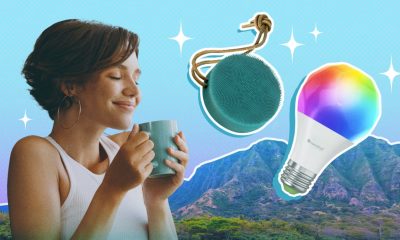Technology
How cleaning your phone with UV rays could protect against coronavirus


The best way to fight the world’s latest cause for panic — coronavirus — is by washing our damn hands.
There’s another strategy that could be handy for protecting ourselves, too: sanitizing our phones so we don’t accidentally compromise the benefits of hand washing.
“The same way your hand may have been contaminated, your phone may have been contaminated,” Dr. Jeffrey Klausner, a professor of epidemiology at UCLA’s Fielding School of Public Health, told Mashable.
It’s possible to sanitize your smartphone with antibacterial wipes. However, human error and damage to the phone’s surface make the slightly higher tech option of cleaning your phone with UV light a good way to go, too.
Water droplet-borne germs spread viruses like the cold, flu, and coronavirus by entering through our mouth, nose, and eyes. When we’re exposed to someone’s sneeze or cough, either directly (gross), or by touching something they might have touched (think: a subway pole), we’re in danger of getting sick by touching our own faces. Germs on our hands are only dangerous because of how often we touch our faces, so hand washing is effective at protecting against getting sick and spreading illness.
But considering that studies show that we pick up our phones hundreds of times a day, we could be undermining our best hand washing efforts. By checking Instagram or sending a text — say, after we’ve washed our hands, but before we pick up a burger — we could be putting those germs lurking on our devices right in our pie holes.
“We call our phones the third hand you never wash,” Dan Barnes, the co-founder one smartphone sanitizing company, PhoneSoap, told Mashable. “Unless you treat your phone the same way as your hands, it’s hard to keep all three clean.”
UCLA’s Klausner sees the potential for smartphones to play a role in disease transmission, but is not especially worried. He says it’s not clear that germs left on smartphone surfaces transmit diseases with the same consistency as air and water-borne germs do. Additionally, he says the contagiousness of germs on a surface “drops dramatically” after a couple of hours.
“We don’t really know how much those materials contribute to transmission,” Klausner said. “Just because you can detect it on those surfaces, it’s unknown how infectious those germs or particles are.”
Still, as COVID-19 spreads around the world, illness prevention is top of mind. So how to make sure that, in addition to regular hand washing, our swiping addiction doesn’t get the best of your immune system?
First of all, take preventive measures with your phone the same way you would with your body. Klausner recommended that during times of heightened potential for infection, don’t share your phone, and definitely don’t hand your phone to a sick person.
If you want to take phone hygiene a step further, there are a few ways you can proactively sanitize your phone. UV light could be a particularly good idea. With UV treatments, like ones provided by PhoneSoap, you expose your phone to UV rays, whether with a wand or something that encases the whole thing — sort of like a tanning bed for your iPhone. The devices then send light waves at the phone’s surface, which disrupts the DNA and prevents it from multiplying and spreading.
“It basically renders the bacteria or virus inert,” Wesley LaPorte, PhoneSoap’s CEO and Co-Founder, said.
According to an MIT study, UV light and antibacterial wipes are both effective. However, some phone makers advise against using wipes because they can damage protective films on the phone’s surface. Additionally, PhoneSoap’s LaPorte pointed out that sometimes wiping your phone yourself is not adequate because the treatment might not be equally distributed, or last for a long enough time to actually kill the bacterial.
If you do want to go the UV route, there are options from several vendors, all with different bells and whistles. PhoneSoap makes a few different models, some meant for use on the go, some to be stored at home. A company called Verilux makes a UV light wand that you wave over your smartphone, LEDMEI’s UV phone chamber doubles as ambient room lighting, and one from Yasolote comes with an essential oil diffuser.
LaPorte recommends cleaning your phone every night, just like you would charge it every night. But you can also step up your game if you’re somewhere where you feel more at risk.
“People should disinfect their phones about as often as they wash their hands in an environment where they’re trying to actively prevent getting the flu,” LaPorte said.
Klausner pointed out that there is no official recommendation for regular phone decontamination or cleaning. PhoneSoap’s Barnes sounded an additional caveat. His product has been proven to protect against common illnesses like the flu and the cold. However, it has not specifically tested its efficacy against coronavirus. They said that the virus’ characteristics are similar to one type of flu virus that it does fight off. But they did not want to overstate the product’s capabilities.
But as public officials are still trying to get a handle on basic information and testing for coronavirus, UV light phone cleaning could be one additional futuristic tool in your pocket.
-

 Business7 days ago
Business7 days agoGoogle Gemini: Everything you need to know about the new generative AI platform
-

 Entertainment5 days ago
Entertainment5 days agoHands-on with the Claude AI app: It’s pleasant to use, but janky
-

 Business5 days ago
Business5 days agoHaun Ventures is riding the bitcoin high
-

 Entertainment7 days ago
Entertainment7 days ago‘Bridgerton’: Everything you need to remember before Season 3
-

 Entertainment4 days ago
Entertainment4 days agoApple Watch Series 9 vs. SE: A smartwatch skeptic tested both for 13 days
-

 Entertainment5 days ago
Entertainment5 days ago5 essential gadgets for turning your home into a self-care sanctuary
-

 Business4 days ago
Business4 days agoApple: pay attention to emerging markets, not falling China sales
-

 Business4 days ago
Business4 days agoGoogle dubs Epic’s demands from its antitrust win ‘unnecessary’ and ‘far beyond the scope’ of the verdict






















